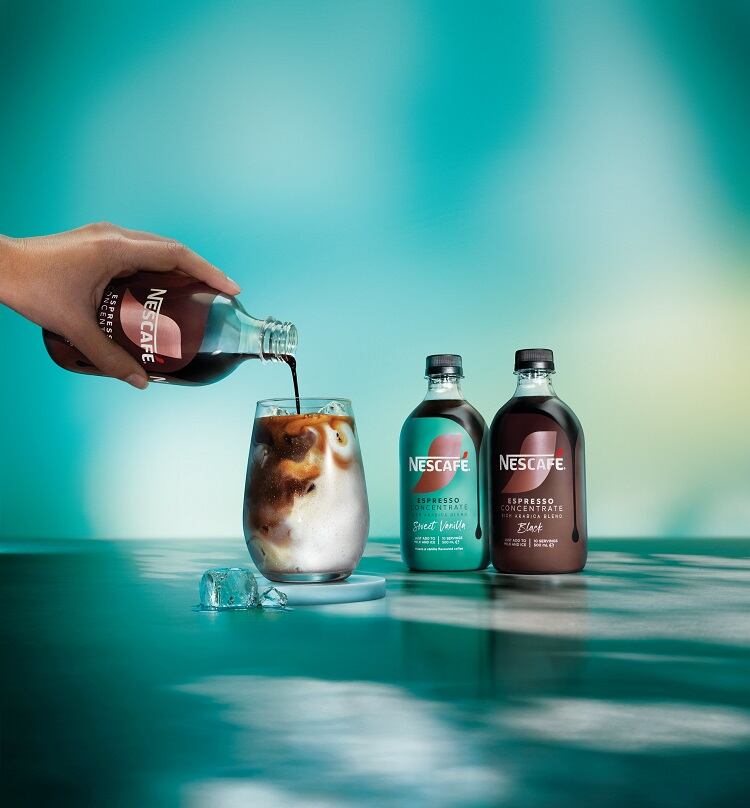The cold coffee trend is ramping up, as consumers become more adventurous in their coffee consumption.
According to Nestlé proprietary research, cold coffee is one of the fastest growing in the coffee industry, with a 15% consumption increase in the past four years. The FMCG major calculates that in 2023, 32% of the coffee consumed out of home was cold – the equivalent of one in every three cups.
In a bid to tap into this growing trend Nestlé is expanding its coffee range with an espresso concentrate, revealing a European launch is on the cards.
A ‘premium liquid coffee concentrate’ in-home
Under its Nescafé brand, Nestlé is rolling out bottles of ‘premium liquid coffee concentrate’ with the aim of bringing the ‘out of home cold coffee experience’ to consumers’ homes. Two flavours are currently available – Sweet Vanilla and Espresso Black – which will be sold in the ambient aisle. Once opened, the bottles need to be refrigerated.
The recommended serving of Nescafé Espresso Concentrate is 50ml per 250ml of liquid, with estimated caffeine content per serve sitting between 120-130mg.
The Espresso Black offerings is made from water, coffee and acidity regulator (sodium bicarbonate). Sweet Vanilla contains water, sugar, coffee, natural flavouring and acidity regulator (sodium bicarbonate).
What's the difference between iced coffee and cold brew?
Nestlé has observed the cold coffee trend grow in recent years. But cold coffee is not strictly the same as iced coffee.
It’s generally understood that iced coffee is made from hot coffee that’s then cooled and served over ice, whereas cold brew is a more time consuming process (coffee grounds are brewed and strained) and made exclusively from cold water.
Cold coffee mixed with juice, tonic or lemonade

Nestlé’s Nescafé Espresso Concentrate is designed to be customisable, meaning that consumers can simply add a shot to milk for an iced latte, to water for an Americano, or get creative with other mixers. “Consumers can customise it to their liking and add it to their favourite beverage,” a Nestlé spokesperson told FoodNavigator.
Juice is one mixer that works well, we were told. “It could be any juice really. Ultimately, the best juice to mix with coffee is a personal preference.
Who's driving the cold coffee trend?
It’s the younger generations in particular driving the cold coffee trend, which has been helped along by the rise of specialty coffee shops and cafés serving a range of cold coffee options.
“You can experiment different combinations to find the one that suits your taste buds the most. We like it with lemonade, tonic or orange juice.”
European expansion on the cards
Initially, Nestlé will launch its coffee concentrate in bottle format into Australia.
“Australia has a large out-of-home cold coffee market with great opportunity to offer consumers quality, convenience and customisable cold coffee solutions for in-home consumption,” the spokesperson explained. “The launch builds on market opportunity, consumer behaviour and trendspotting potential.
At the same time, the offering will be sold in single serve pods in China via e-commerce platforms.
How does Nescafé currently serve the cold coffee market?
The launch is not Nestlé’s first within the cold coffee sphere for its Nescafé brand. In the UK, for example, the company sells sachets of iced coffees, including Iced Salted Caramel Latte and Iced Vanilla Cream Latte products.
The plan is to expand its reach worldwide over the coming years, including into Europe. As to which countries within Europe Nestlé is currently eyeing for a future launch, the company has yet to announce: “It’s still too soon to confirm exact markets.”



